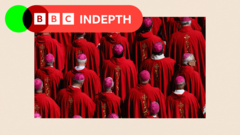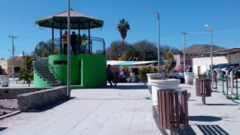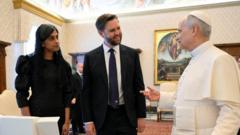The upcoming selection of the new Pope brings to light the contrasting perspectives within the Vatican as cardinals weigh diverse global issues against the framework established during Pope Francis's tenure.
The Conclave: Navigating Divides in the Vatican’s Future

The Conclave: Navigating Divides in the Vatican’s Future
As the conclave approaches, cardinals grapple with the legacies of Pope Francis amidst internal divisions.
The Vatican's Santa Marta guesthouse will soon accommodate the cardinals gathered for the conclave to elect the next Pope, with one room notably sealed since its previous tenant, Pope Francis, passed away on Easter Monday. This sealed suite serves as a poignant reminder of the Pope’s significant impact and the challenges ahead for the Church. Francis’s influence looms large: he appointed approximately 80% of the cardinals who will partake in the selection of his successor.
In the lead-up to this papal election, discussions among cardinals frequently reflect on Francis's transformative agenda aimed at broadening the Church's reach beyond Vatican hierarchy and engaging with the faithful globally, emphasizing outreach to the poor and marginalized.
While some cardinals are striving for continuity in Francis's initiatives, critics express skepticism about his reforms. The conclave represents a clash of ideologies, with some traditionalists lamenting what they perceive as deviations from established Church teachings, as highlighted by recent interactions in pre-conclave general congregations.
This year's conclave is marked by unprecedented diversity. Representation from nations like South Sudan and Papua New Guinea exemplifies a broader perspective on global Catholicism, urging a new pope to recognize and address localized issues such as poverty and conflict which contrast sharply with the challenges faced by the Church in Europe.
The multifaceted role of the pope encompasses spiritual authority as well as global political influence, which manifests in advocacy on key issues including social justice and climate change. As the cardinals meet to deliberate, many are aware that the new pontiff will need to balance these responsibilities while addressing significant institutional challenges, including ongoing concerns regarding clerical abuse and financial integrity.
Despite some differences among cardinals, there is a collective yearning for clarity and direction post-Francis. Many Catholics sense an urgency for the next leader to bridge gaps both within the Church and in the wider world, continuing the dialogue initiated by the late Pope.
Heartfelt messages resonated during the funeral, reinforcing the enduring legacies that the next pope will be tasked with upholding—dignity for migrants, environmental stewardship, and fostering peace. In the days leading to the conclave, the theme of unity emerges, underscoring the collective responsibility to transform the Church for its congregation and those beyond its walls.
As the cardinals prepare to cast their votes, ultimately, they will be urged to seek divine guidance in their decision as they navigate this pivotal moment in Vatican history.
In the lead-up to this papal election, discussions among cardinals frequently reflect on Francis's transformative agenda aimed at broadening the Church's reach beyond Vatican hierarchy and engaging with the faithful globally, emphasizing outreach to the poor and marginalized.
While some cardinals are striving for continuity in Francis's initiatives, critics express skepticism about his reforms. The conclave represents a clash of ideologies, with some traditionalists lamenting what they perceive as deviations from established Church teachings, as highlighted by recent interactions in pre-conclave general congregations.
This year's conclave is marked by unprecedented diversity. Representation from nations like South Sudan and Papua New Guinea exemplifies a broader perspective on global Catholicism, urging a new pope to recognize and address localized issues such as poverty and conflict which contrast sharply with the challenges faced by the Church in Europe.
The multifaceted role of the pope encompasses spiritual authority as well as global political influence, which manifests in advocacy on key issues including social justice and climate change. As the cardinals meet to deliberate, many are aware that the new pontiff will need to balance these responsibilities while addressing significant institutional challenges, including ongoing concerns regarding clerical abuse and financial integrity.
Despite some differences among cardinals, there is a collective yearning for clarity and direction post-Francis. Many Catholics sense an urgency for the next leader to bridge gaps both within the Church and in the wider world, continuing the dialogue initiated by the late Pope.
Heartfelt messages resonated during the funeral, reinforcing the enduring legacies that the next pope will be tasked with upholding—dignity for migrants, environmental stewardship, and fostering peace. In the days leading to the conclave, the theme of unity emerges, underscoring the collective responsibility to transform the Church for its congregation and those beyond its walls.
As the cardinals prepare to cast their votes, ultimately, they will be urged to seek divine guidance in their decision as they navigate this pivotal moment in Vatican history.





















